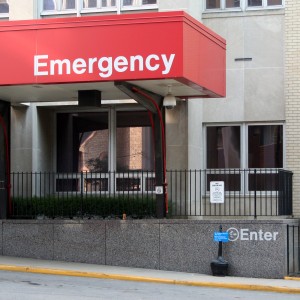 DALLAS — Officials in Liberia may prosecute a man who brought the Ebola virus to the United States after he allegedly lied on a questionnaire before boarding a plane out of the country, reports state.
DALLAS — Officials in Liberia may prosecute a man who brought the Ebola virus to the United States after he allegedly lied on a questionnaire before boarding a plane out of the country, reports state.
Binyah Kesselly, chairman of the board of directors of the Liberia Airport Authority, told reporters this week that Thomas Eric Duncan answered “no” to a question regarding whether he had cared for anyone with the virus or touched the body of someone who died from Ebola. However, information now reveals that Duncan had helped a pregnant woman who had the virus get to the hospital in Liberia.
As previously reported, in a press conference on Tuesday afternoon, CDC Director Thomas Frieden outlined that Duncan—whose name was not released to the public at that time—arrived in the United States on September 20, but exhibited no symptoms of the virus. It was not until four or five days later that he began feeling ill.
Last Friday, Duncan went to Presbyterian Hospital in Dallas, where he was given medication and released. As his condition worsened, Duncan returned to the hospital on Sunday, when he was officially admitted as a patient. This week, tests were performed that were found to be positive for the Ebola virus.
“We received in our laboratory today specimens from the individual, tested them and they tested positive for Ebola,” Frieden confirmed. “The State of Texas also operates a laboratory that found the same results.”
The hospital states that Duncan told a nurse last week that he had arrived from Liberia, but the information was not relayed to doctors due to a “flaw” in its electronic records system that prevented physicians from viewing his travel history. However, the hospital notes, “[w]hen Mr. Duncan was asked if he had been around anyone who had been ill, he said that he had not.”
Duncan is now on “strict isolation” to ensure that the virus is contained, and his family members have all been quarantined until at least October 19th.
The CDC reiterated on Tuesday that those who were near Duncan, such as on the flight to America, have nothing to fear as persons cannot spread the virus until they are actually sick. Duncan did not become ill until after arriving in the U.S. However, there are concerns regarding who Duncan may have come in contact with since arriving on American soil, especially at or near the apartment building where he was staying.
Liberian President Ellen Johnson Sirleaf told the CBC on Thursday that she would be consulting with attorneys as to whether to pursue criminal charges against Duncan when he returns to Liberia.
“The fact that he knew [he was exposed to Ebola] and he left the country is unpardonable, quite frankly,” Johnson Sirleaf she stated. “I just hope that nobody else gets infected.”
“With the U.S. doing so much to help us fight Ebola, and again one of our compatriots didn’t take due care, and so, he’s gone there and … put some Americans in a state of fear, and put them at some risk,” she continued. “I feel very saddened by that and very angry with him, to tell you the truth.”
Ebola has been exclusive to West Africa, with Liberia reportedly being the hardest hit. Over 3,000 people have died from the virus since its initial outbreak in March. American Christian humanitarian organizations have been working in Africa to assist those that are ill, but at least two people have contracted the disease themselves while seeking to help others.
Dr. Kent Brantly and aid worker Nancy Writebol arrived back in the United States last month after they were diagnosed with Ebola while serving in Liberia. The two have made a complete recovery after continuing their treatment in American hospitals and are crediting their survival to the grace of God.
“I am forever thankful to God for sparing my life and I am glad for any attention my sickness brought to the plight in West Africa amidst this epidemic,” Brantley stated during a news conference on August 21st. “[T]hank you to my family, my friends, my church family and to all who lifted me up in prayer, asking for my healing and recovery. Please do not stop praying for the people of Liberia and West Africa, and for a quick end to this Ebola epidemic.”
As Brantley and Writebol were diagnosed in Africa and not America, reports credit Duncan’s case in Dallas as the first to be diagnosed on American soil.
Become a Christian News Network Supporter...


